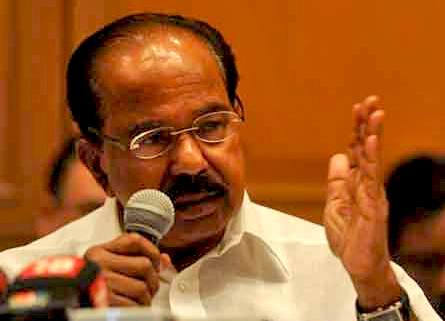 Tumkur, Jun 1: The increase in prices of petrol and diesel was to respond to the rupee depreciation, Union Petroleum and Natural Gas Minister Veerappa Moily said today defending the hike effected after the rupee hit a 11-month low making oil imports costlier.
Tumkur, Jun 1: The increase in prices of petrol and diesel was to respond to the rupee depreciation, Union Petroleum and Natural Gas Minister Veerappa Moily said today defending the hike effected after the rupee hit a 11-month low making oil imports costlier.
"Petrol price you should know that (for) every one rupee depreciation it will cost Rs 9,000 crore. Where do you find that Rs 9,000 crore. We cannot manufacture money. It has to be collected from some resources. Therefore we collect that much, not more than that," he said.
Moily was speaking to reporters on the sidelines of a function to unveil Direct Benefit Transfer for LPG Consumer Scheme here.
Replying to a query about many lacunae in the Direct Transfer for LPG Consumers Scheme, Moily said "errors will be corrected as and when it is implemented."
Moily took exception to Tamil Nadu Chief Minister Jayalalithaa slamming the Centre for increasing petrol and diesel price soon after Karnataka assembly elections.
He said it was the decision of the oil companies to increase fuel prices as the Central Government has authorised them to make appropriate changes in this regard.
"No. There is no link between the fuel price hike and Karnataka Assembly elections. The Central Government has authorised oil companies to make appropriate changes in petrol and diesel prices."
Indian oil companies had hiked the prices of petrol by 75 paise and diesel by 50 paise per litre while effecting a Rs 45 cut in LPG cylinder price. The increase excluding local sales tax or VAT, came into effect from midnight.





Comments
Add new comment